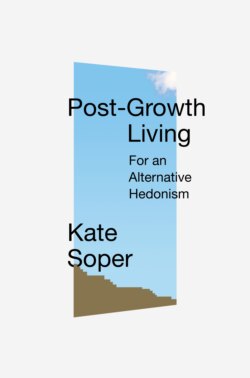Читать книгу Post-Growth Living - Kate Soper - Страница 6
На сайте Литреса книга снята с продажи.
ОглавлениеAcknowledgements
The thinking that has gone into this book goes back a long way. The origins of this thinking derive in part from my early interests in the philosophy of human need and welfare, and the encouragement given me by postgraduate tutors at Sussex University, namely John Mepham and Geoffrey Nowell Smith. The evolution of my argument on consumption and environmental politics, and specifically around ‘alternative hedonism’, has owed much since then to discussions with fellow philosophers at London Metropolitan University and my research colleagues in the Institute for the Study of European Transformations. From 2004–2006, the project I undertook on ‘Alternative Hedonism, the Theory and Politics of Consumption’ was in receipt of an ESRC/AHRB funded research grant in the ‘Cultures of Consumption’ programme. I am grateful for that support and to my co-researcher on the project, Lyn Thomas, for the media study she contributed and for the intellectual support and friendship she has given me throughout. I would also like to thank Frank Trentmann, the Director of the Programme, for his helpful input and advice, and his editorial collaboration.
I should mention here, too, the stimulus provided by discussions resulting from invitations to guest teach or provide papers for conferences at the universities of Amsterdam, Bilgi Instanbul, Copenhagen, Corvinus Budapest, Colorado School of Mines, Hamburg, the National University of Ireland at Galway and Cork, Linköping, Münster, Palacký Olomouc, Oslo, Tallinn, Trinity College (Dublin), Stockholm, Uppsala and Utrecht. In Britain I am grateful to the following universities and colleges: Bath Spa, Birkbeck, Brighton, Goldsmiths, East London, Edinburgh, Essex, Lancaster, Liverpool, Manchester, Newport, Queen Mary, Roehampton, SOAS, Strathclyde and Warwick, and Camberwell College of Arts, Plymouth Art College (at Dartington Hall), the Sustainable Development Commission at DEFRA, the Serpentine Gallery, the Wellcome Institute and the Whitechapel Gallery. Special thanks here should go to Andreas Malm for his initial interest in my work and for inviting me to be a guest lecturer at the LUCID Research Centre at Lund University in Sweden in 2011. Thus began a valued relationship with Lund University and especially with the Pufendorf Institute for Advanced Studies, where I was a Visiting Research Fellow attached to the project on ‘Sustainable Welfare’ during 2014–2015. I am grateful in particular to its director at the time, Sune Sunesson, and to Max Koch and Oksana Mont, the project coordinators, my co-author Maria Emmelin, and all those involved in this research. I also thank the current director, Ann-Katrin Bäcklund, for her continuing interest.
My thanks also go to Rosie Warren at Verso, for first persuading me back into writing on alternative hedonism, and to John Merrick, my editor, for his enthusiasm and very able guidance on the book. My daughter, Maddy Ryle, has offered some excellent advice and additions at certain points, and my six-year old grandson, Caspar Roa-Ryle, has been mildly ironic about the need for its production, but overall quite tolerant of it. If there is one person I have to thank above all for guiding me in its writing, it is Martin Ryle, who has, as usual, shown himself to be a marvellous editor, and endlessly diligent in teasing out the confusions of my arguments, cutting out undue flights of rhetoric, and improving my more inept expressions. This has been all the more heroic of him, given how familiar he had already become, over years of talking and co-writing on the central topics of the book, with almost everything I have to say in it.
Rodmell, November 2019
